Christian Ethics: A Study of Core Principles and Abortion Views
VerifiedAdded on 2020/03/23
|12
|2986
|885
Essay
AI Summary
This essay offers a comprehensive exploration of Christian ethics, beginning with an introduction to the terms 'Christian' and 'ethics,' and the core values derived from the teachings of Jesus Christ. It delves into the historical relationship between Christianity and politics, highlighting the separation of church and state and the influence of Protestantism. The essay examines Christian political ethics, including views from various theological perspectives, and the role of the Bible as a moral guide. A significant portion is dedicated to the controversial topic of abortion, presenting diverse Christian viewpoints, from the condemnation of abortion as a sin to the stances of different denominations like Roman Catholics and Protestants. The essay references key biblical texts and historical documents to provide a well-rounded understanding of Christian ethics and its application to contemporary issues.
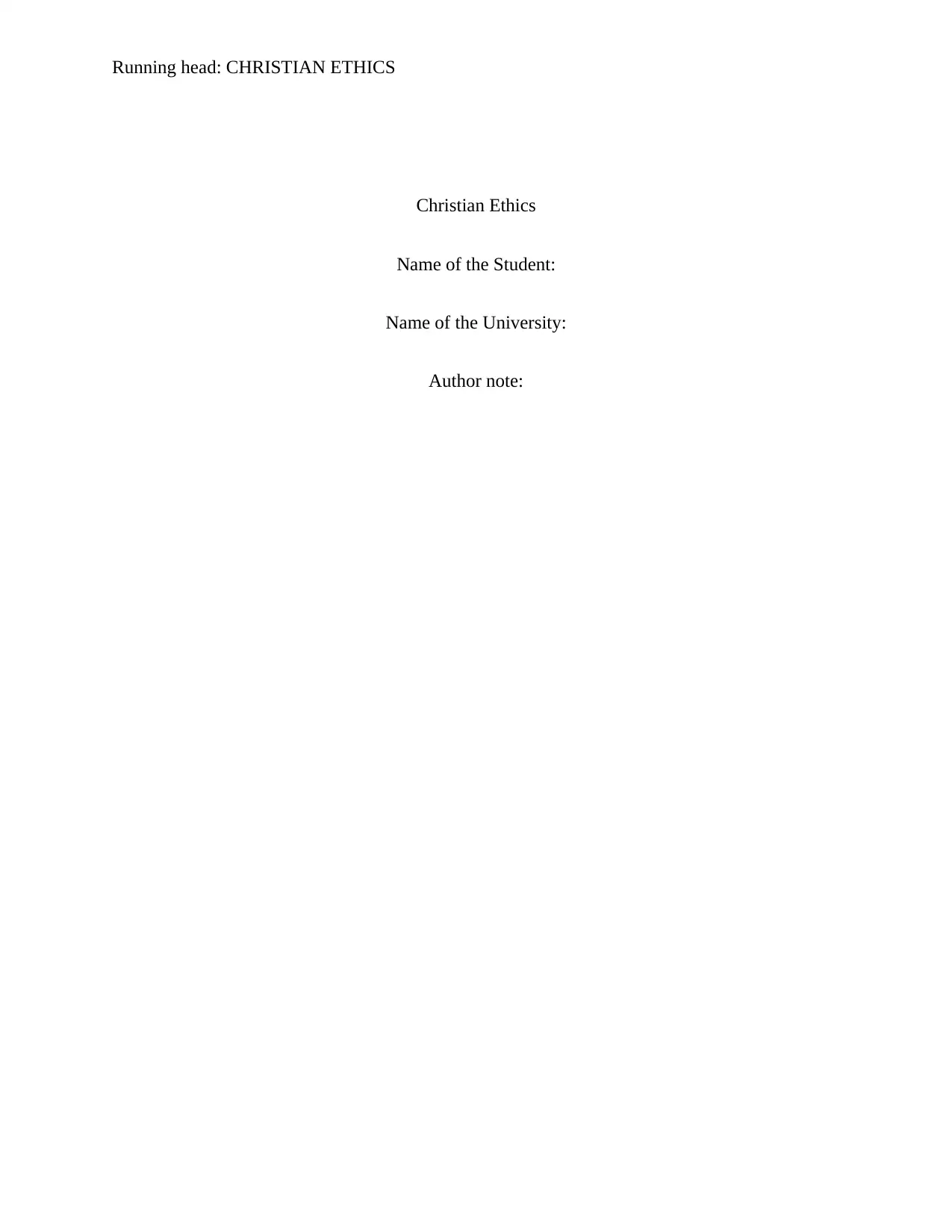
Running head: CHRISTIAN ETHICS
Christian Ethics
Name of the Student:
Name of the University:
Author note:
Christian Ethics
Name of the Student:
Name of the University:
Author note:
Paraphrase This Document
Need a fresh take? Get an instant paraphrase of this document with our AI Paraphraser
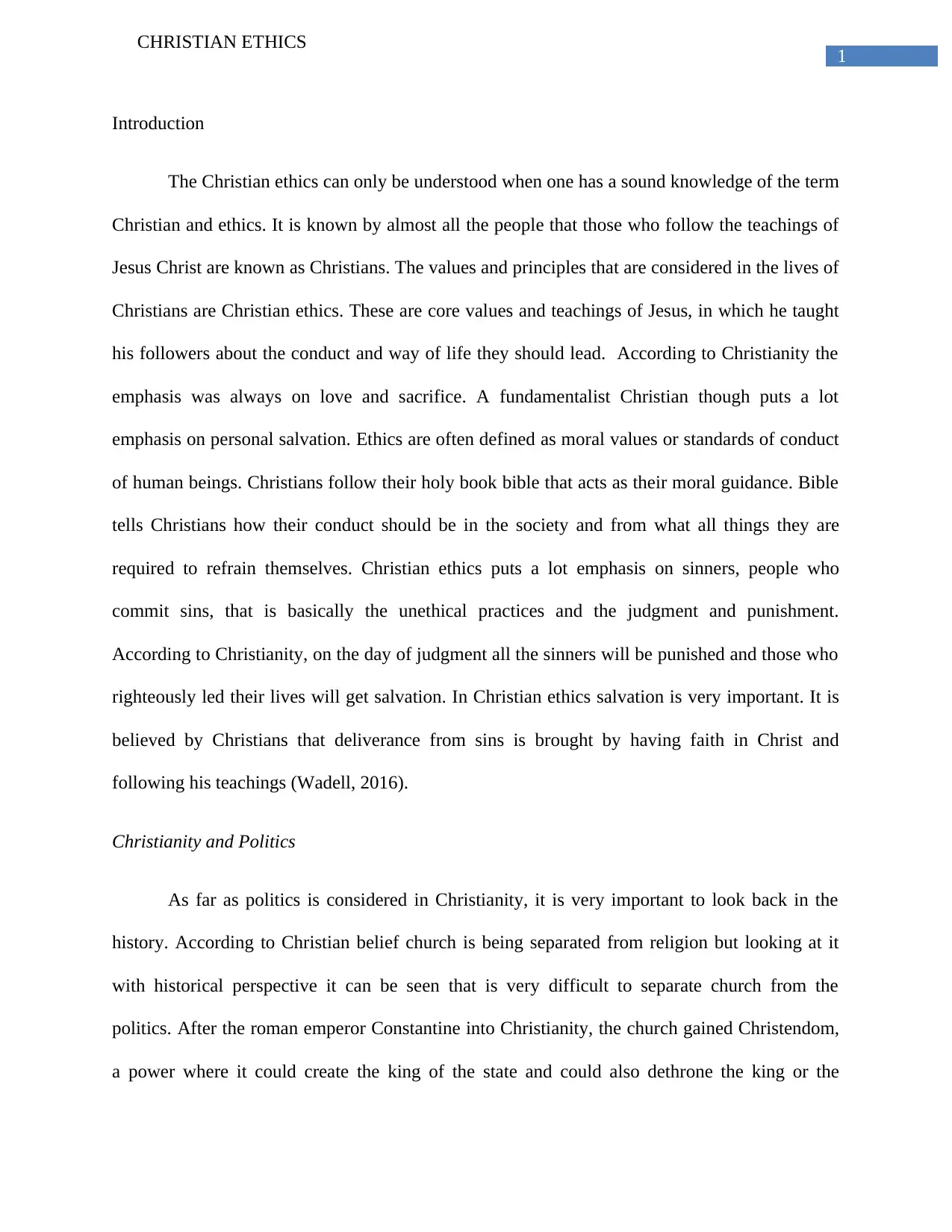
1
CHRISTIAN ETHICS
Introduction
The Christian ethics can only be understood when one has a sound knowledge of the term
Christian and ethics. It is known by almost all the people that those who follow the teachings of
Jesus Christ are known as Christians. The values and principles that are considered in the lives of
Christians are Christian ethics. These are core values and teachings of Jesus, in which he taught
his followers about the conduct and way of life they should lead. According to Christianity the
emphasis was always on love and sacrifice. A fundamentalist Christian though puts a lot
emphasis on personal salvation. Ethics are often defined as moral values or standards of conduct
of human beings. Christians follow their holy book bible that acts as their moral guidance. Bible
tells Christians how their conduct should be in the society and from what all things they are
required to refrain themselves. Christian ethics puts a lot emphasis on sinners, people who
commit sins, that is basically the unethical practices and the judgment and punishment.
According to Christianity, on the day of judgment all the sinners will be punished and those who
righteously led their lives will get salvation. In Christian ethics salvation is very important. It is
believed by Christians that deliverance from sins is brought by having faith in Christ and
following his teachings (Wadell, 2016).
Christianity and Politics
As far as politics is considered in Christianity, it is very important to look back in the
history. According to Christian belief church is being separated from religion but looking at it
with historical perspective it can be seen that is very difficult to separate church from the
politics. After the roman emperor Constantine into Christianity, the church gained Christendom,
a power where it could create the king of the state and could also dethrone the king or the
CHRISTIAN ETHICS
Introduction
The Christian ethics can only be understood when one has a sound knowledge of the term
Christian and ethics. It is known by almost all the people that those who follow the teachings of
Jesus Christ are known as Christians. The values and principles that are considered in the lives of
Christians are Christian ethics. These are core values and teachings of Jesus, in which he taught
his followers about the conduct and way of life they should lead. According to Christianity the
emphasis was always on love and sacrifice. A fundamentalist Christian though puts a lot
emphasis on personal salvation. Ethics are often defined as moral values or standards of conduct
of human beings. Christians follow their holy book bible that acts as their moral guidance. Bible
tells Christians how their conduct should be in the society and from what all things they are
required to refrain themselves. Christian ethics puts a lot emphasis on sinners, people who
commit sins, that is basically the unethical practices and the judgment and punishment.
According to Christianity, on the day of judgment all the sinners will be punished and those who
righteously led their lives will get salvation. In Christian ethics salvation is very important. It is
believed by Christians that deliverance from sins is brought by having faith in Christ and
following his teachings (Wadell, 2016).
Christianity and Politics
As far as politics is considered in Christianity, it is very important to look back in the
history. According to Christian belief church is being separated from religion but looking at it
with historical perspective it can be seen that is very difficult to separate church from the
politics. After the roman emperor Constantine into Christianity, the church gained Christendom,
a power where it could create the king of the state and could also dethrone the king or the
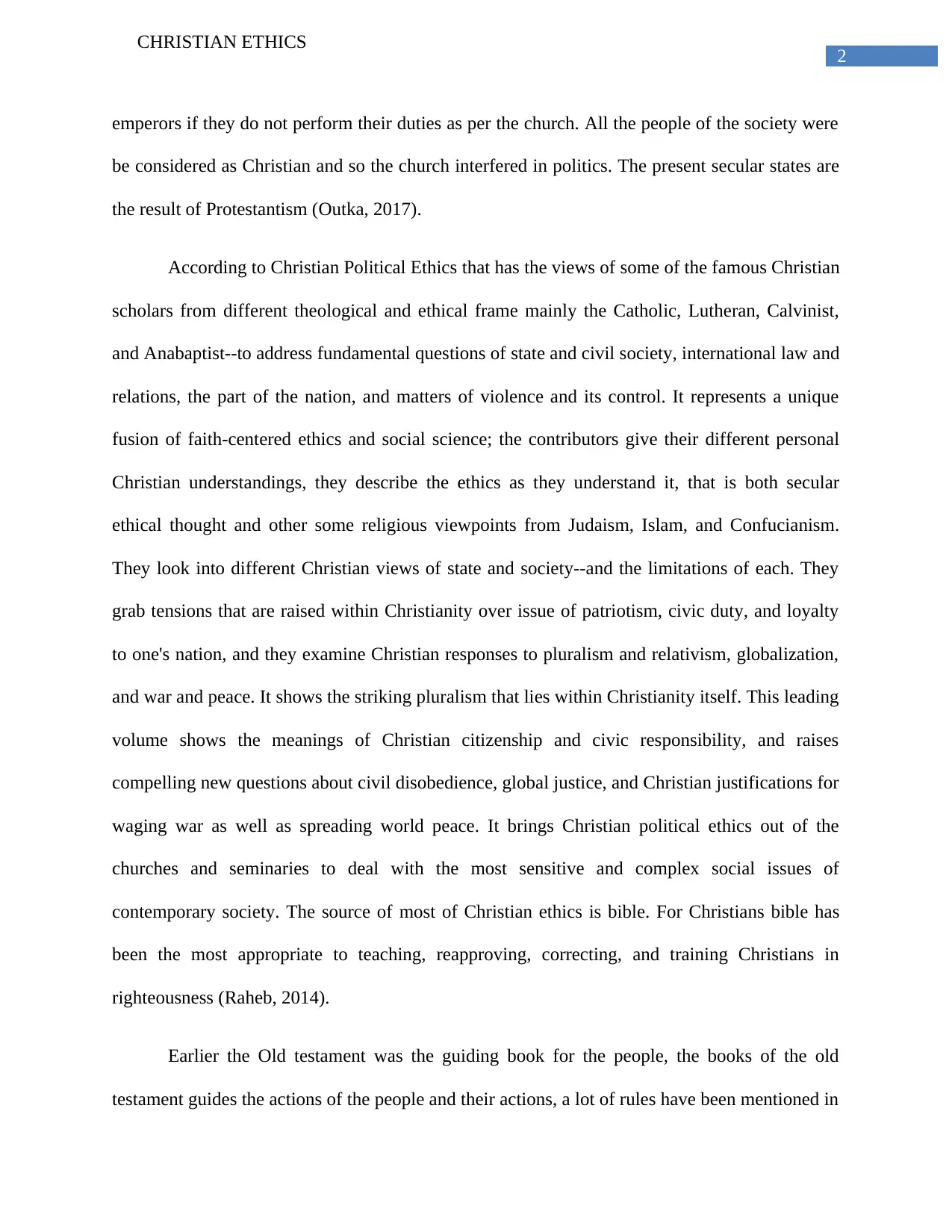
2
CHRISTIAN ETHICS
emperors if they do not perform their duties as per the church. All the people of the society were
be considered as Christian and so the church interfered in politics. The present secular states are
the result of Protestantism (Outka, 2017).
According to Christian Political Ethics that has the views of some of the famous Christian
scholars from different theological and ethical frame mainly the Catholic, Lutheran, Calvinist,
and Anabaptist--to address fundamental questions of state and civil society, international law and
relations, the part of the nation, and matters of violence and its control. It represents a unique
fusion of faith-centered ethics and social science; the contributors give their different personal
Christian understandings, they describe the ethics as they understand it, that is both secular
ethical thought and other some religious viewpoints from Judaism, Islam, and Confucianism.
They look into different Christian views of state and society--and the limitations of each. They
grab tensions that are raised within Christianity over issue of patriotism, civic duty, and loyalty
to one's nation, and they examine Christian responses to pluralism and relativism, globalization,
and war and peace. It shows the striking pluralism that lies within Christianity itself. This leading
volume shows the meanings of Christian citizenship and civic responsibility, and raises
compelling new questions about civil disobedience, global justice, and Christian justifications for
waging war as well as spreading world peace. It brings Christian political ethics out of the
churches and seminaries to deal with the most sensitive and complex social issues of
contemporary society. The source of most of Christian ethics is bible. For Christians bible has
been the most appropriate to teaching, reapproving, correcting, and training Christians in
righteousness (Raheb, 2014).
Earlier the Old testament was the guiding book for the people, the books of the old
testament guides the actions of the people and their actions, a lot of rules have been mentioned in
CHRISTIAN ETHICS
emperors if they do not perform their duties as per the church. All the people of the society were
be considered as Christian and so the church interfered in politics. The present secular states are
the result of Protestantism (Outka, 2017).
According to Christian Political Ethics that has the views of some of the famous Christian
scholars from different theological and ethical frame mainly the Catholic, Lutheran, Calvinist,
and Anabaptist--to address fundamental questions of state and civil society, international law and
relations, the part of the nation, and matters of violence and its control. It represents a unique
fusion of faith-centered ethics and social science; the contributors give their different personal
Christian understandings, they describe the ethics as they understand it, that is both secular
ethical thought and other some religious viewpoints from Judaism, Islam, and Confucianism.
They look into different Christian views of state and society--and the limitations of each. They
grab tensions that are raised within Christianity over issue of patriotism, civic duty, and loyalty
to one's nation, and they examine Christian responses to pluralism and relativism, globalization,
and war and peace. It shows the striking pluralism that lies within Christianity itself. This leading
volume shows the meanings of Christian citizenship and civic responsibility, and raises
compelling new questions about civil disobedience, global justice, and Christian justifications for
waging war as well as spreading world peace. It brings Christian political ethics out of the
churches and seminaries to deal with the most sensitive and complex social issues of
contemporary society. The source of most of Christian ethics is bible. For Christians bible has
been the most appropriate to teaching, reapproving, correcting, and training Christians in
righteousness (Raheb, 2014).
Earlier the Old testament was the guiding book for the people, the books of the old
testament guides the actions of the people and their actions, a lot of rules have been mentioned in
⊘ This is a preview!⊘
Do you want full access?
Subscribe today to unlock all pages.

Trusted by 1+ million students worldwide
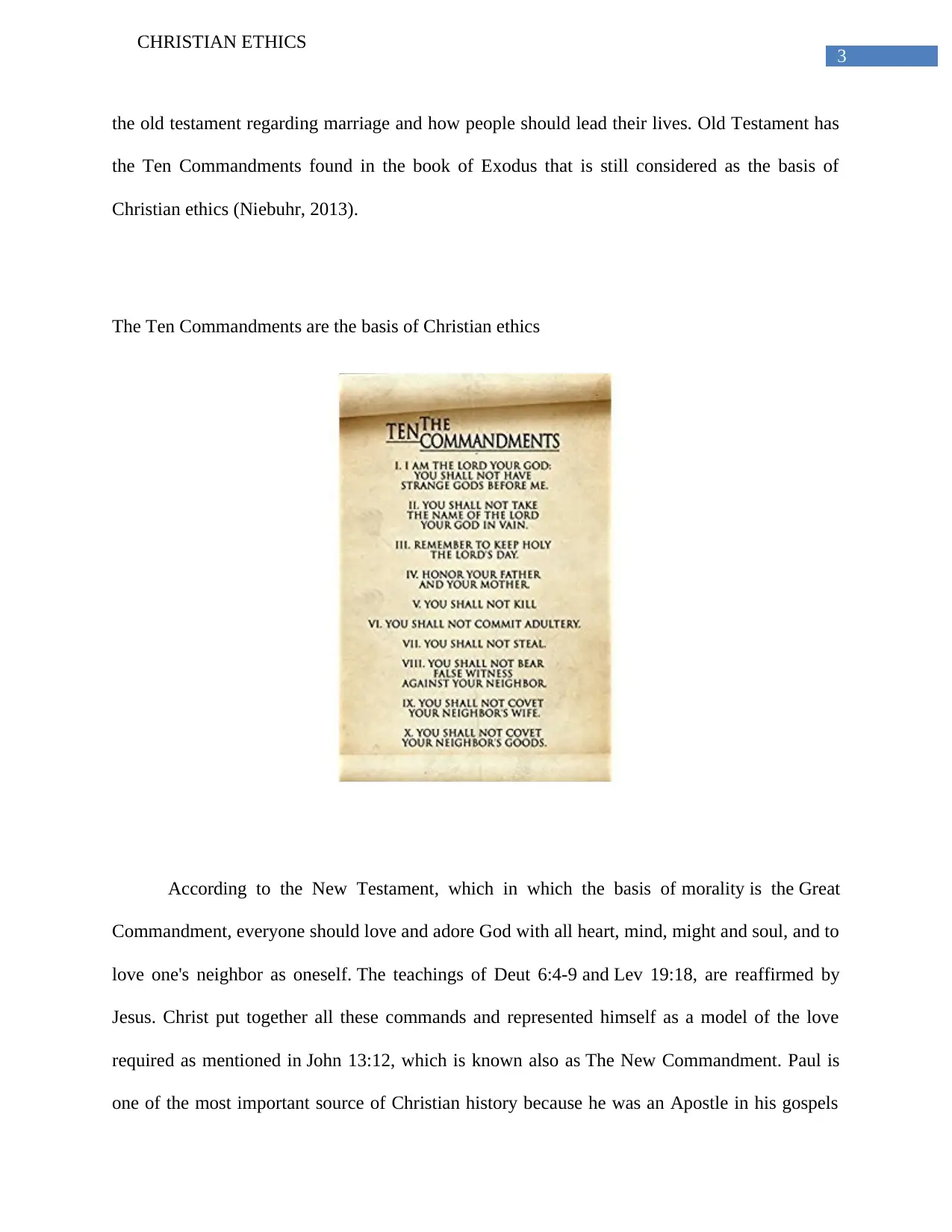
3
CHRISTIAN ETHICS
the old testament regarding marriage and how people should lead their lives. Old Testament has
the Ten Commandments found in the book of Exodus that is still considered as the basis of
Christian ethics (Niebuhr, 2013).
The Ten Commandments are the basis of Christian ethics
According to the New Testament, which in which the basis of morality is the Great
Commandment, everyone should love and adore God with all heart, mind, might and soul, and to
love one's neighbor as oneself. The teachings of Deut 6:4-9 and Lev 19:18, are reaffirmed by
Jesus. Christ put together all these commands and represented himself as a model of the love
required as mentioned in John 13:12, which is known also as The New Commandment. Paul is
one of the most important source of Christian history because he was an Apostle in his gospels
CHRISTIAN ETHICS
the old testament regarding marriage and how people should lead their lives. Old Testament has
the Ten Commandments found in the book of Exodus that is still considered as the basis of
Christian ethics (Niebuhr, 2013).
The Ten Commandments are the basis of Christian ethics
According to the New Testament, which in which the basis of morality is the Great
Commandment, everyone should love and adore God with all heart, mind, might and soul, and to
love one's neighbor as oneself. The teachings of Deut 6:4-9 and Lev 19:18, are reaffirmed by
Jesus. Christ put together all these commands and represented himself as a model of the love
required as mentioned in John 13:12, which is known also as The New Commandment. Paul is
one of the most important source of Christian history because he was an Apostle in his gospels
Paraphrase This Document
Need a fresh take? Get an instant paraphrase of this document with our AI Paraphraser
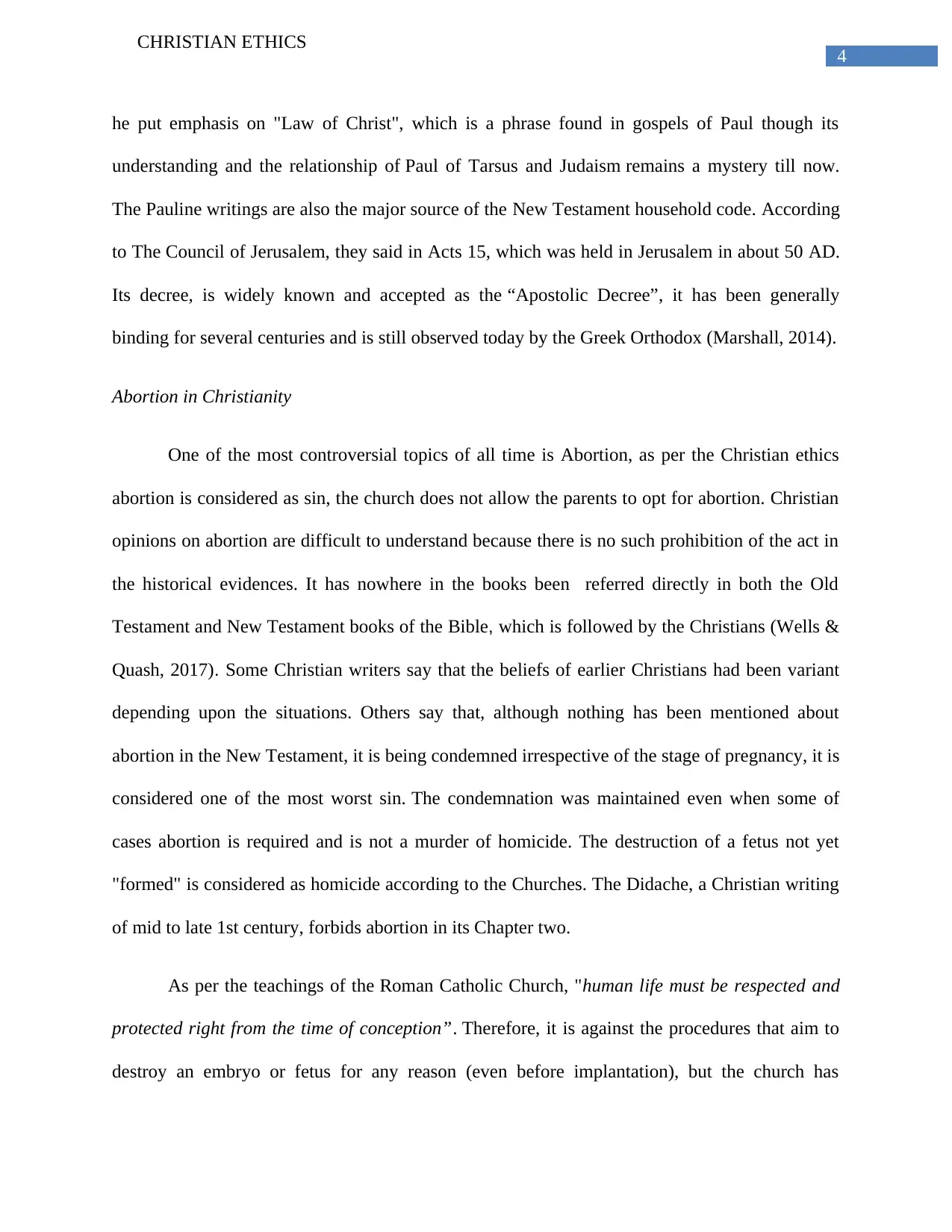
4
CHRISTIAN ETHICS
he put emphasis on "Law of Christ", which is a phrase found in gospels of Paul though its
understanding and the relationship of Paul of Tarsus and Judaism remains a mystery till now.
The Pauline writings are also the major source of the New Testament household code. According
to The Council of Jerusalem, they said in Acts 15, which was held in Jerusalem in about 50 AD.
Its decree, is widely known and accepted as the “Apostolic Decree”, it has been generally
binding for several centuries and is still observed today by the Greek Orthodox (Marshall, 2014).
Abortion in Christianity
One of the most controversial topics of all time is Abortion, as per the Christian ethics
abortion is considered as sin, the church does not allow the parents to opt for abortion. Christian
opinions on abortion are difficult to understand because there is no such prohibition of the act in
the historical evidences. It has nowhere in the books been referred directly in both the Old
Testament and New Testament books of the Bible, which is followed by the Christians (Wells &
Quash, 2017). Some Christian writers say that the beliefs of earlier Christians had been variant
depending upon the situations. Others say that, although nothing has been mentioned about
abortion in the New Testament, it is being condemned irrespective of the stage of pregnancy, it is
considered one of the most worst sin. The condemnation was maintained even when some of
cases abortion is required and is not a murder of homicide. The destruction of a fetus not yet
"formed" is considered as homicide according to the Churches. The Didache, a Christian writing
of mid to late 1st century, forbids abortion in its Chapter two.
As per the teachings of the Roman Catholic Church, "human life must be respected and
protected right from the time of conception”. Therefore, it is against the procedures that aim to
destroy an embryo or fetus for any reason (even before implantation), but the church has
CHRISTIAN ETHICS
he put emphasis on "Law of Christ", which is a phrase found in gospels of Paul though its
understanding and the relationship of Paul of Tarsus and Judaism remains a mystery till now.
The Pauline writings are also the major source of the New Testament household code. According
to The Council of Jerusalem, they said in Acts 15, which was held in Jerusalem in about 50 AD.
Its decree, is widely known and accepted as the “Apostolic Decree”, it has been generally
binding for several centuries and is still observed today by the Greek Orthodox (Marshall, 2014).
Abortion in Christianity
One of the most controversial topics of all time is Abortion, as per the Christian ethics
abortion is considered as sin, the church does not allow the parents to opt for abortion. Christian
opinions on abortion are difficult to understand because there is no such prohibition of the act in
the historical evidences. It has nowhere in the books been referred directly in both the Old
Testament and New Testament books of the Bible, which is followed by the Christians (Wells &
Quash, 2017). Some Christian writers say that the beliefs of earlier Christians had been variant
depending upon the situations. Others say that, although nothing has been mentioned about
abortion in the New Testament, it is being condemned irrespective of the stage of pregnancy, it is
considered one of the most worst sin. The condemnation was maintained even when some of
cases abortion is required and is not a murder of homicide. The destruction of a fetus not yet
"formed" is considered as homicide according to the Churches. The Didache, a Christian writing
of mid to late 1st century, forbids abortion in its Chapter two.
As per the teachings of the Roman Catholic Church, "human life must be respected and
protected right from the time of conception”. Therefore, it is against the procedures that aim to
destroy an embryo or fetus for any reason (even before implantation), but the church has
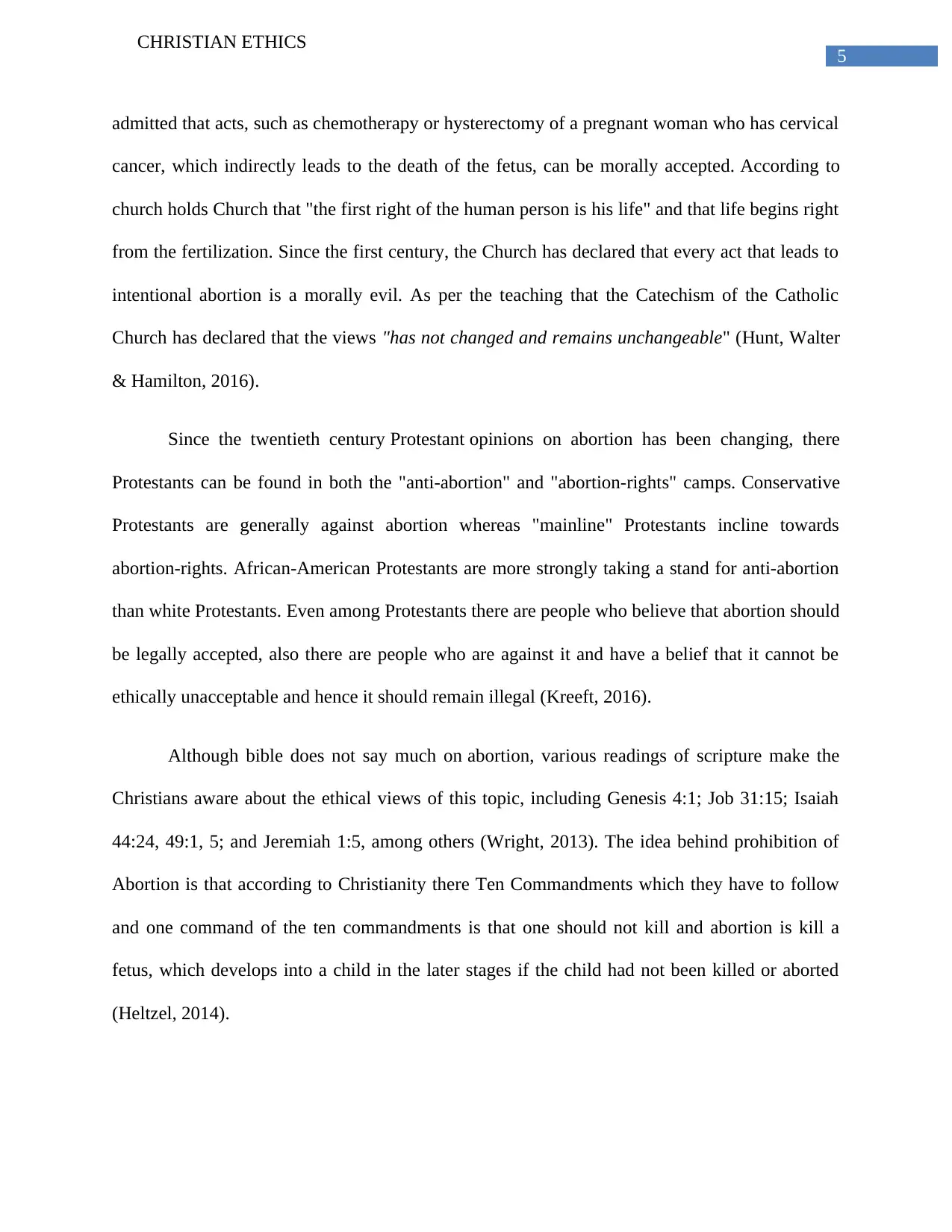
5
CHRISTIAN ETHICS
admitted that acts, such as chemotherapy or hysterectomy of a pregnant woman who has cervical
cancer, which indirectly leads to the death of the fetus, can be morally accepted. According to
church holds Church that "the first right of the human person is his life" and that life begins right
from the fertilization. Since the first century, the Church has declared that every act that leads to
intentional abortion is a morally evil. As per the teaching that the Catechism of the Catholic
Church has declared that the views "has not changed and remains unchangeable" (Hunt, Walter
& Hamilton, 2016).
Since the twentieth century Protestant opinions on abortion has been changing, there
Protestants can be found in both the "anti-abortion" and "abortion-rights" camps. Conservative
Protestants are generally against abortion whereas "mainline" Protestants incline towards
abortion-rights. African-American Protestants are more strongly taking a stand for anti-abortion
than white Protestants. Even among Protestants there are people who believe that abortion should
be legally accepted, also there are people who are against it and have a belief that it cannot be
ethically unacceptable and hence it should remain illegal (Kreeft, 2016).
Although bible does not say much on abortion, various readings of scripture make the
Christians aware about the ethical views of this topic, including Genesis 4:1; Job 31:15; Isaiah
44:24, 49:1, 5; and Jeremiah 1:5, among others (Wright, 2013). The idea behind prohibition of
Abortion is that according to Christianity there Ten Commandments which they have to follow
and one command of the ten commandments is that one should not kill and abortion is kill a
fetus, which develops into a child in the later stages if the child had not been killed or aborted
(Heltzel, 2014).
CHRISTIAN ETHICS
admitted that acts, such as chemotherapy or hysterectomy of a pregnant woman who has cervical
cancer, which indirectly leads to the death of the fetus, can be morally accepted. According to
church holds Church that "the first right of the human person is his life" and that life begins right
from the fertilization. Since the first century, the Church has declared that every act that leads to
intentional abortion is a morally evil. As per the teaching that the Catechism of the Catholic
Church has declared that the views "has not changed and remains unchangeable" (Hunt, Walter
& Hamilton, 2016).
Since the twentieth century Protestant opinions on abortion has been changing, there
Protestants can be found in both the "anti-abortion" and "abortion-rights" camps. Conservative
Protestants are generally against abortion whereas "mainline" Protestants incline towards
abortion-rights. African-American Protestants are more strongly taking a stand for anti-abortion
than white Protestants. Even among Protestants there are people who believe that abortion should
be legally accepted, also there are people who are against it and have a belief that it cannot be
ethically unacceptable and hence it should remain illegal (Kreeft, 2016).
Although bible does not say much on abortion, various readings of scripture make the
Christians aware about the ethical views of this topic, including Genesis 4:1; Job 31:15; Isaiah
44:24, 49:1, 5; and Jeremiah 1:5, among others (Wright, 2013). The idea behind prohibition of
Abortion is that according to Christianity there Ten Commandments which they have to follow
and one command of the ten commandments is that one should not kill and abortion is kill a
fetus, which develops into a child in the later stages if the child had not been killed or aborted
(Heltzel, 2014).
⊘ This is a preview!⊘
Do you want full access?
Subscribe today to unlock all pages.

Trusted by 1+ million students worldwide
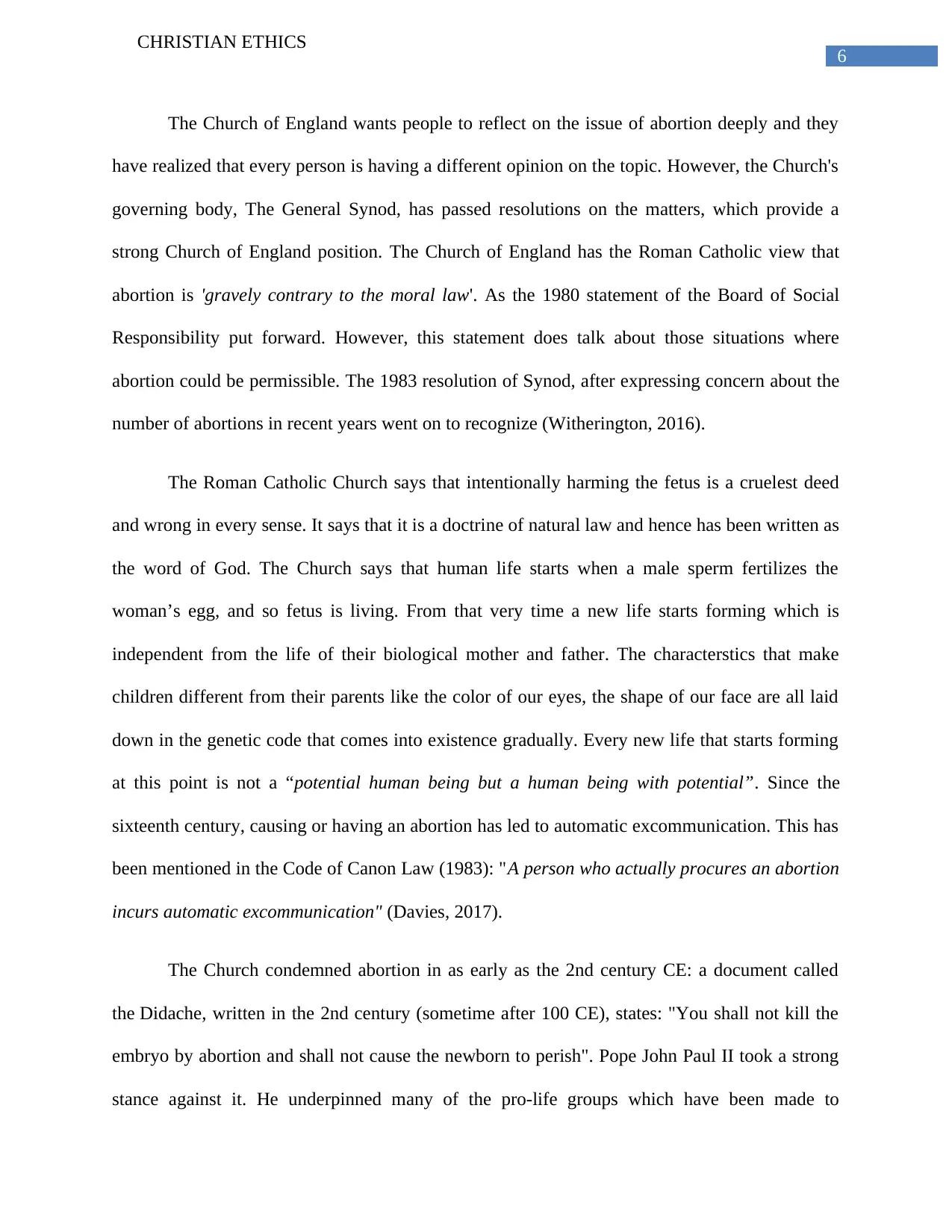
6
CHRISTIAN ETHICS
The Church of England wants people to reflect on the issue of abortion deeply and they
have realized that every person is having a different opinion on the topic. However, the Church's
governing body, The General Synod, has passed resolutions on the matters, which provide a
strong Church of England position. The Church of England has the Roman Catholic view that
abortion is 'gravely contrary to the moral law'. As the 1980 statement of the Board of Social
Responsibility put forward. However, this statement does talk about those situations where
abortion could be permissible. The 1983 resolution of Synod, after expressing concern about the
number of abortions in recent years went on to recognize (Witherington, 2016).
The Roman Catholic Church says that intentionally harming the fetus is a cruelest deed
and wrong in every sense. It says that it is a doctrine of natural law and hence has been written as
the word of God. The Church says that human life starts when a male sperm fertilizes the
woman’s egg, and so fetus is living. From that very time a new life starts forming which is
independent from the life of their biological mother and father. The characterstics that make
children different from their parents like the color of our eyes, the shape of our face are all laid
down in the genetic code that comes into existence gradually. Every new life that starts forming
at this point is not a “potential human being but a human being with potential”. Since the
sixteenth century, causing or having an abortion has led to automatic excommunication. This has
been mentioned in the Code of Canon Law (1983): "A person who actually procures an abortion
incurs automatic excommunication" (Davies, 2017).
The Church condemned abortion in as early as the 2nd century CE: a document called
the Didache, written in the 2nd century (sometime after 100 CE), states: "You shall not kill the
embryo by abortion and shall not cause the newborn to perish". Pope John Paul II took a strong
stance against it. He underpinned many of the pro-life groups which have been made to
CHRISTIAN ETHICS
The Church of England wants people to reflect on the issue of abortion deeply and they
have realized that every person is having a different opinion on the topic. However, the Church's
governing body, The General Synod, has passed resolutions on the matters, which provide a
strong Church of England position. The Church of England has the Roman Catholic view that
abortion is 'gravely contrary to the moral law'. As the 1980 statement of the Board of Social
Responsibility put forward. However, this statement does talk about those situations where
abortion could be permissible. The 1983 resolution of Synod, after expressing concern about the
number of abortions in recent years went on to recognize (Witherington, 2016).
The Roman Catholic Church says that intentionally harming the fetus is a cruelest deed
and wrong in every sense. It says that it is a doctrine of natural law and hence has been written as
the word of God. The Church says that human life starts when a male sperm fertilizes the
woman’s egg, and so fetus is living. From that very time a new life starts forming which is
independent from the life of their biological mother and father. The characterstics that make
children different from their parents like the color of our eyes, the shape of our face are all laid
down in the genetic code that comes into existence gradually. Every new life that starts forming
at this point is not a “potential human being but a human being with potential”. Since the
sixteenth century, causing or having an abortion has led to automatic excommunication. This has
been mentioned in the Code of Canon Law (1983): "A person who actually procures an abortion
incurs automatic excommunication" (Davies, 2017).
The Church condemned abortion in as early as the 2nd century CE: a document called
the Didache, written in the 2nd century (sometime after 100 CE), states: "You shall not kill the
embryo by abortion and shall not cause the newborn to perish". Pope John Paul II took a strong
stance against it. He underpinned many of the pro-life groups which have been made to
Paraphrase This Document
Need a fresh take? Get an instant paraphrase of this document with our AI Paraphraser
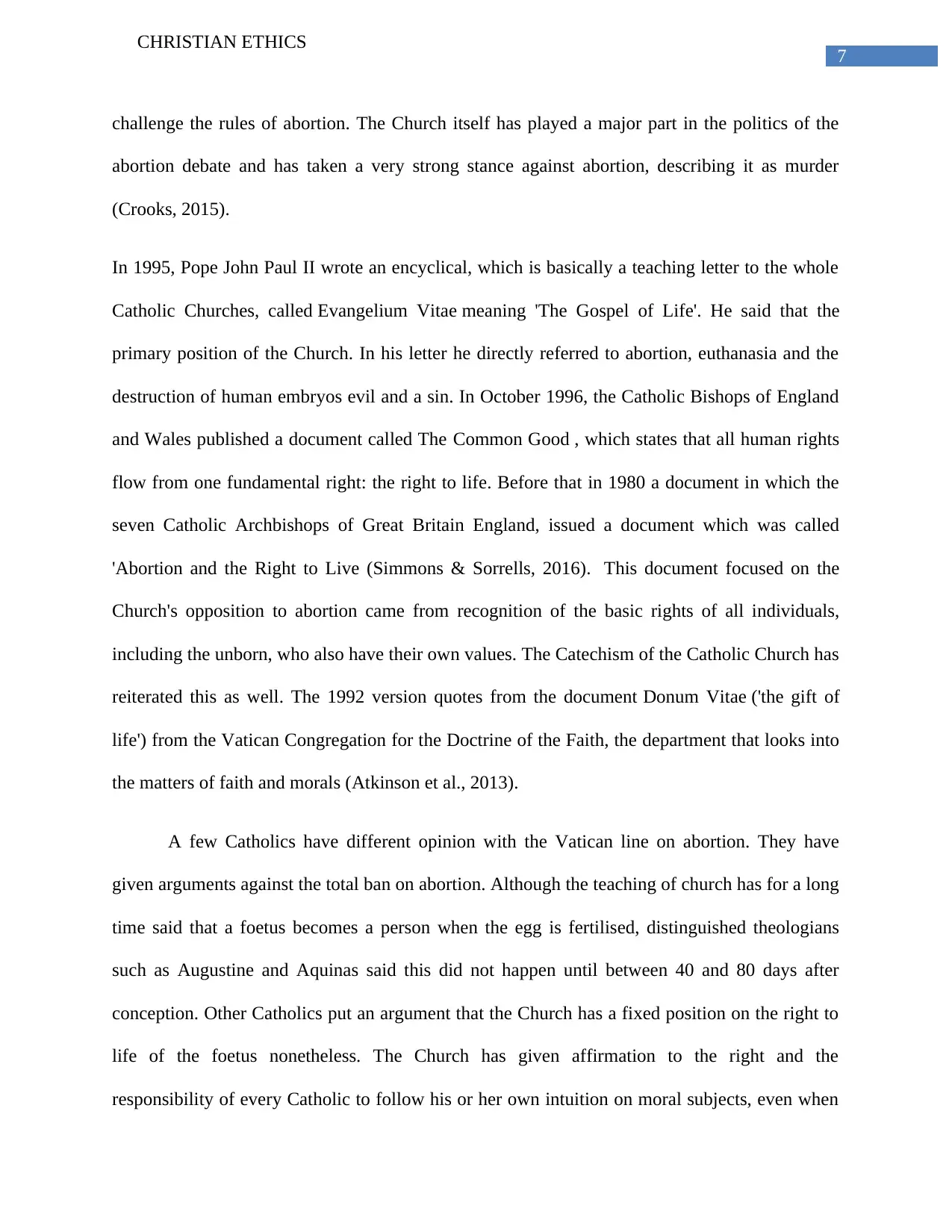
7
CHRISTIAN ETHICS
challenge the rules of abortion. The Church itself has played a major part in the politics of the
abortion debate and has taken a very strong stance against abortion, describing it as murder
(Crooks, 2015).
In 1995, Pope John Paul II wrote an encyclical, which is basically a teaching letter to the whole
Catholic Churches, called Evangelium Vitae meaning 'The Gospel of Life'. He said that the
primary position of the Church. In his letter he directly referred to abortion, euthanasia and the
destruction of human embryos evil and a sin. In October 1996, the Catholic Bishops of England
and Wales published a document called The Common Good , which states that all human rights
flow from one fundamental right: the right to life. Before that in 1980 a document in which the
seven Catholic Archbishops of Great Britain England, issued a document which was called
'Abortion and the Right to Live (Simmons & Sorrells, 2016). This document focused on the
Church's opposition to abortion came from recognition of the basic rights of all individuals,
including the unborn, who also have their own values. The Catechism of the Catholic Church has
reiterated this as well. The 1992 version quotes from the document Donum Vitae ('the gift of
life') from the Vatican Congregation for the Doctrine of the Faith, the department that looks into
the matters of faith and morals (Atkinson et al., 2013).
A few Catholics have different opinion with the Vatican line on abortion. They have
given arguments against the total ban on abortion. Although the teaching of church has for a long
time said that a foetus becomes a person when the egg is fertilised, distinguished theologians
such as Augustine and Aquinas said this did not happen until between 40 and 80 days after
conception. Other Catholics put an argument that the Church has a fixed position on the right to
life of the foetus nonetheless. The Church has given affirmation to the right and the
responsibility of every Catholic to follow his or her own intuition on moral subjects, even when
CHRISTIAN ETHICS
challenge the rules of abortion. The Church itself has played a major part in the politics of the
abortion debate and has taken a very strong stance against abortion, describing it as murder
(Crooks, 2015).
In 1995, Pope John Paul II wrote an encyclical, which is basically a teaching letter to the whole
Catholic Churches, called Evangelium Vitae meaning 'The Gospel of Life'. He said that the
primary position of the Church. In his letter he directly referred to abortion, euthanasia and the
destruction of human embryos evil and a sin. In October 1996, the Catholic Bishops of England
and Wales published a document called The Common Good , which states that all human rights
flow from one fundamental right: the right to life. Before that in 1980 a document in which the
seven Catholic Archbishops of Great Britain England, issued a document which was called
'Abortion and the Right to Live (Simmons & Sorrells, 2016). This document focused on the
Church's opposition to abortion came from recognition of the basic rights of all individuals,
including the unborn, who also have their own values. The Catechism of the Catholic Church has
reiterated this as well. The 1992 version quotes from the document Donum Vitae ('the gift of
life') from the Vatican Congregation for the Doctrine of the Faith, the department that looks into
the matters of faith and morals (Atkinson et al., 2013).
A few Catholics have different opinion with the Vatican line on abortion. They have
given arguments against the total ban on abortion. Although the teaching of church has for a long
time said that a foetus becomes a person when the egg is fertilised, distinguished theologians
such as Augustine and Aquinas said this did not happen until between 40 and 80 days after
conception. Other Catholics put an argument that the Church has a fixed position on the right to
life of the foetus nonetheless. The Church has given affirmation to the right and the
responsibility of every Catholic to follow his or her own intuition on moral subjects, even when
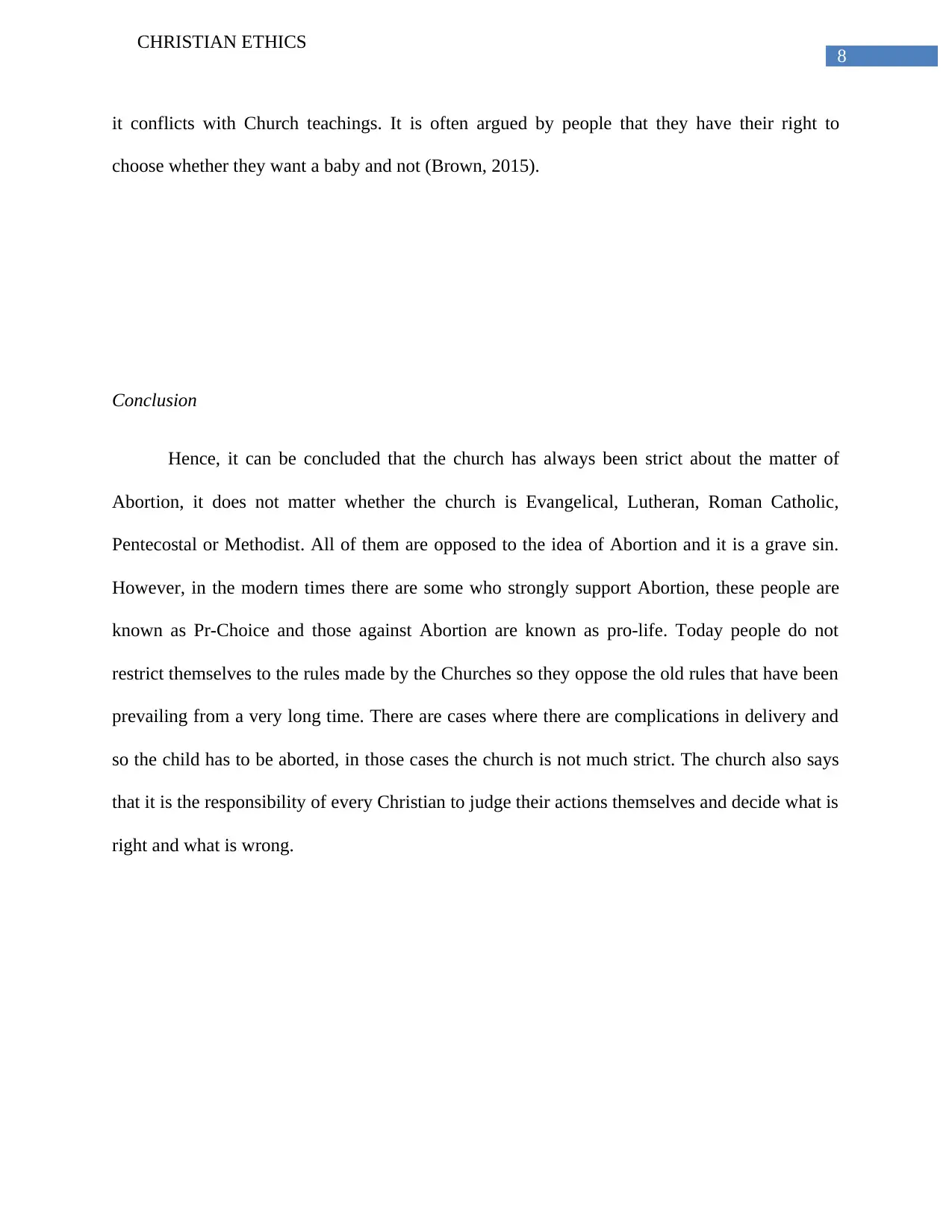
8
CHRISTIAN ETHICS
it conflicts with Church teachings. It is often argued by people that they have their right to
choose whether they want a baby and not (Brown, 2015).
Conclusion
Hence, it can be concluded that the church has always been strict about the matter of
Abortion, it does not matter whether the church is Evangelical, Lutheran, Roman Catholic,
Pentecostal or Methodist. All of them are opposed to the idea of Abortion and it is a grave sin.
However, in the modern times there are some who strongly support Abortion, these people are
known as Pr-Choice and those against Abortion are known as pro-life. Today people do not
restrict themselves to the rules made by the Churches so they oppose the old rules that have been
prevailing from a very long time. There are cases where there are complications in delivery and
so the child has to be aborted, in those cases the church is not much strict. The church also says
that it is the responsibility of every Christian to judge their actions themselves and decide what is
right and what is wrong.
CHRISTIAN ETHICS
it conflicts with Church teachings. It is often argued by people that they have their right to
choose whether they want a baby and not (Brown, 2015).
Conclusion
Hence, it can be concluded that the church has always been strict about the matter of
Abortion, it does not matter whether the church is Evangelical, Lutheran, Roman Catholic,
Pentecostal or Methodist. All of them are opposed to the idea of Abortion and it is a grave sin.
However, in the modern times there are some who strongly support Abortion, these people are
known as Pr-Choice and those against Abortion are known as pro-life. Today people do not
restrict themselves to the rules made by the Churches so they oppose the old rules that have been
prevailing from a very long time. There are cases where there are complications in delivery and
so the child has to be aborted, in those cases the church is not much strict. The church also says
that it is the responsibility of every Christian to judge their actions themselves and decide what is
right and what is wrong.
⊘ This is a preview!⊘
Do you want full access?
Subscribe today to unlock all pages.

Trusted by 1+ million students worldwide
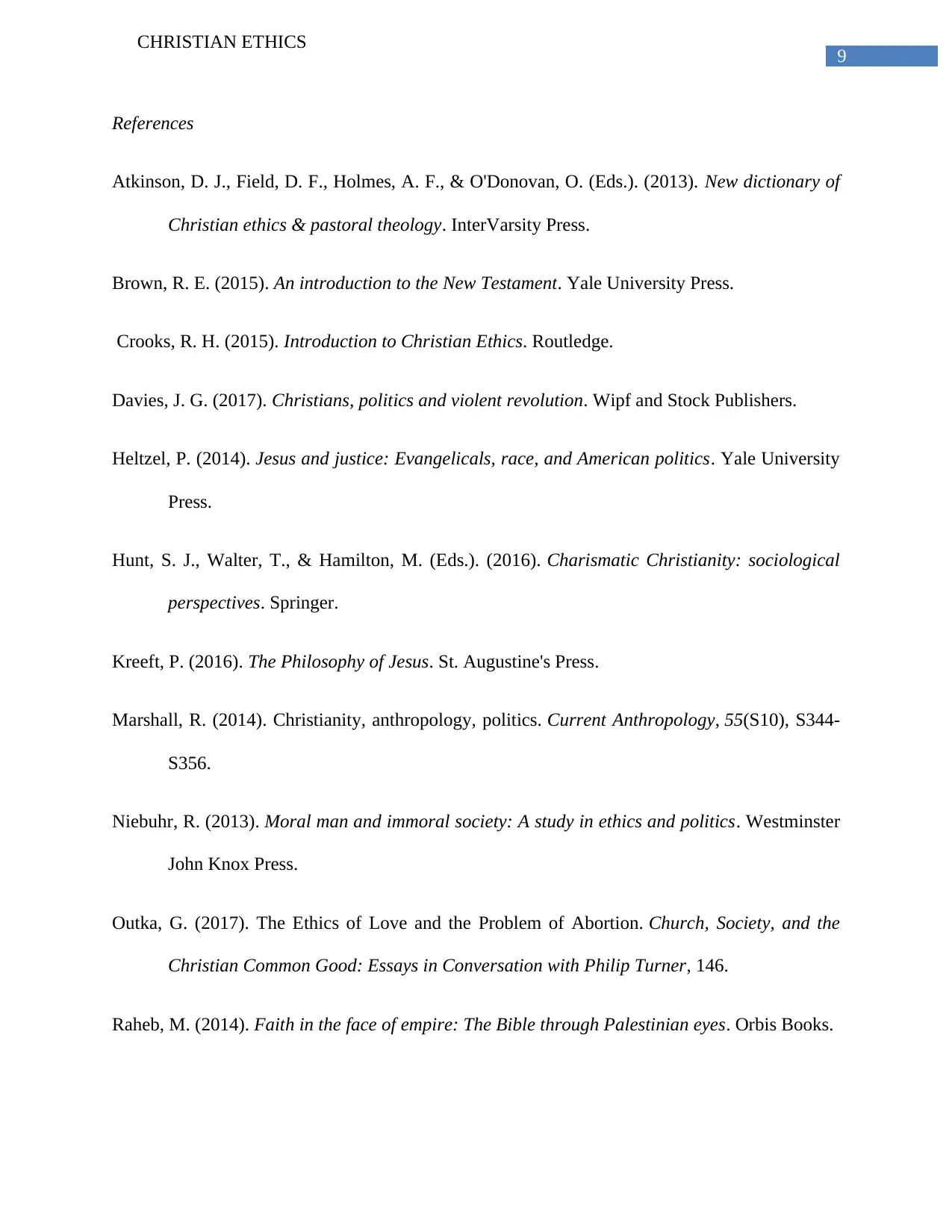
9
CHRISTIAN ETHICS
References
Atkinson, D. J., Field, D. F., Holmes, A. F., & O'Donovan, O. (Eds.). (2013). New dictionary of
Christian ethics & pastoral theology. InterVarsity Press.
Brown, R. E. (2015). An introduction to the New Testament. Yale University Press.
Crooks, R. H. (2015). Introduction to Christian Ethics. Routledge.
Davies, J. G. (2017). Christians, politics and violent revolution. Wipf and Stock Publishers.
Heltzel, P. (2014). Jesus and justice: Evangelicals, race, and American politics. Yale University
Press.
Hunt, S. J., Walter, T., & Hamilton, M. (Eds.). (2016). Charismatic Christianity: sociological
perspectives. Springer.
Kreeft, P. (2016). The Philosophy of Jesus. St. Augustine's Press.
Marshall, R. (2014). Christianity, anthropology, politics. Current Anthropology, 55(S10), S344-
S356.
Niebuhr, R. (2013). Moral man and immoral society: A study in ethics and politics. Westminster
John Knox Press.
Outka, G. (2017). The Ethics of Love and the Problem of Abortion. Church, Society, and the
Christian Common Good: Essays in Conversation with Philip Turner, 146.
Raheb, M. (2014). Faith in the face of empire: The Bible through Palestinian eyes. Orbis Books.
CHRISTIAN ETHICS
References
Atkinson, D. J., Field, D. F., Holmes, A. F., & O'Donovan, O. (Eds.). (2013). New dictionary of
Christian ethics & pastoral theology. InterVarsity Press.
Brown, R. E. (2015). An introduction to the New Testament. Yale University Press.
Crooks, R. H. (2015). Introduction to Christian Ethics. Routledge.
Davies, J. G. (2017). Christians, politics and violent revolution. Wipf and Stock Publishers.
Heltzel, P. (2014). Jesus and justice: Evangelicals, race, and American politics. Yale University
Press.
Hunt, S. J., Walter, T., & Hamilton, M. (Eds.). (2016). Charismatic Christianity: sociological
perspectives. Springer.
Kreeft, P. (2016). The Philosophy of Jesus. St. Augustine's Press.
Marshall, R. (2014). Christianity, anthropology, politics. Current Anthropology, 55(S10), S344-
S356.
Niebuhr, R. (2013). Moral man and immoral society: A study in ethics and politics. Westminster
John Knox Press.
Outka, G. (2017). The Ethics of Love and the Problem of Abortion. Church, Society, and the
Christian Common Good: Essays in Conversation with Philip Turner, 146.
Raheb, M. (2014). Faith in the face of empire: The Bible through Palestinian eyes. Orbis Books.
Paraphrase This Document
Need a fresh take? Get an instant paraphrase of this document with our AI Paraphraser
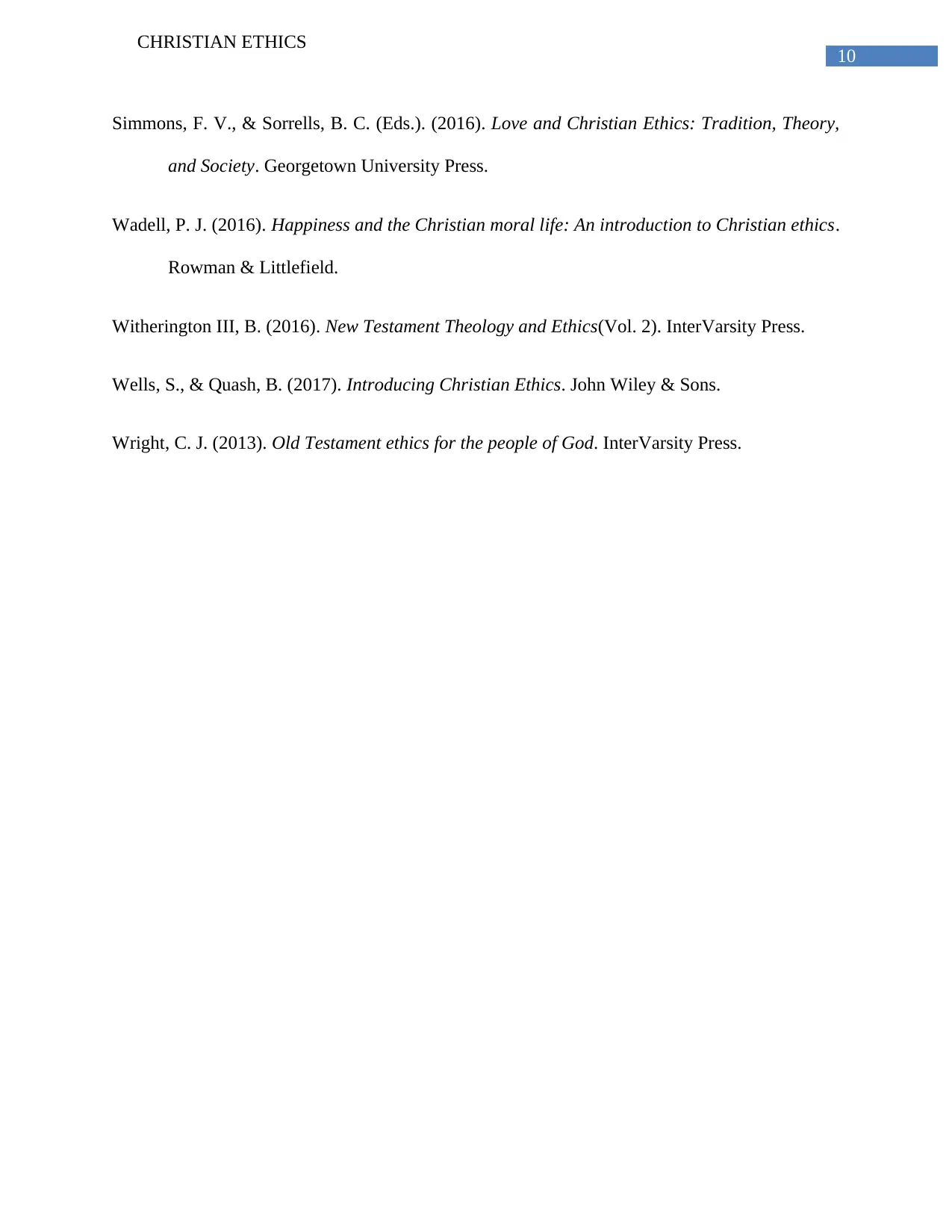
10
CHRISTIAN ETHICS
Simmons, F. V., & Sorrells, B. C. (Eds.). (2016). Love and Christian Ethics: Tradition, Theory,
and Society. Georgetown University Press.
Wadell, P. J. (2016). Happiness and the Christian moral life: An introduction to Christian ethics.
Rowman & Littlefield.
Witherington III, B. (2016). New Testament Theology and Ethics(Vol. 2). InterVarsity Press.
Wells, S., & Quash, B. (2017). Introducing Christian Ethics. John Wiley & Sons.
Wright, C. J. (2013). Old Testament ethics for the people of God. InterVarsity Press.
CHRISTIAN ETHICS
Simmons, F. V., & Sorrells, B. C. (Eds.). (2016). Love and Christian Ethics: Tradition, Theory,
and Society. Georgetown University Press.
Wadell, P. J. (2016). Happiness and the Christian moral life: An introduction to Christian ethics.
Rowman & Littlefield.
Witherington III, B. (2016). New Testament Theology and Ethics(Vol. 2). InterVarsity Press.
Wells, S., & Quash, B. (2017). Introducing Christian Ethics. John Wiley & Sons.
Wright, C. J. (2013). Old Testament ethics for the people of God. InterVarsity Press.

11
CHRISTIAN ETHICS
That in situations where the continuance of a pregnancy threatens the life of the
CHRISTIAN ETHICS
That in situations where the continuance of a pregnancy threatens the life of the
⊘ This is a preview!⊘
Do you want full access?
Subscribe today to unlock all pages.

Trusted by 1+ million students worldwide
1 out of 12
Related Documents
Your All-in-One AI-Powered Toolkit for Academic Success.
+13062052269
info@desklib.com
Available 24*7 on WhatsApp / Email
![[object Object]](/_next/static/media/star-bottom.7253800d.svg)
Unlock your academic potential
Copyright © 2020–2026 A2Z Services. All Rights Reserved. Developed and managed by ZUCOL.





